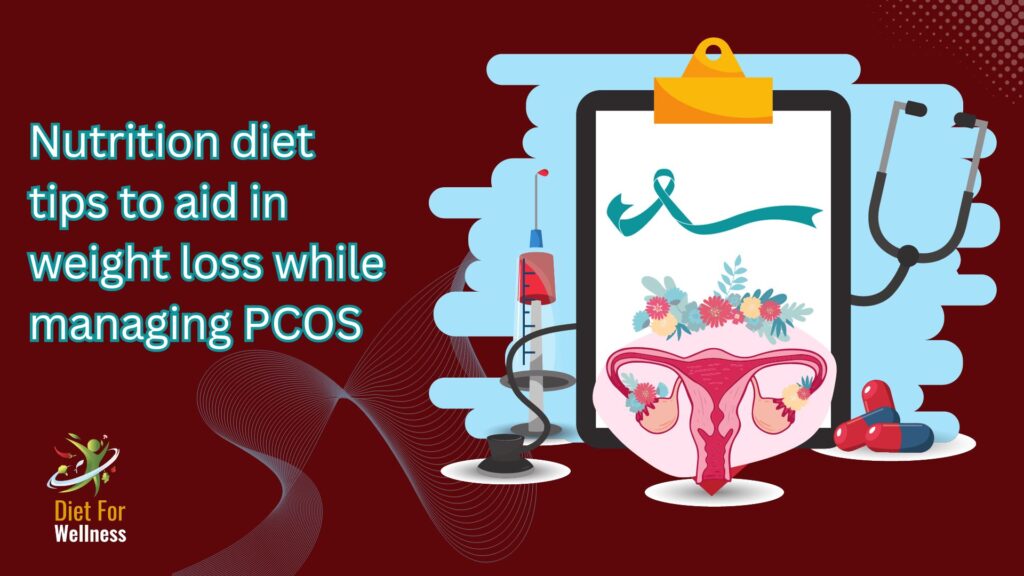Effective diet tips for those struggling to lose weight with PCOS

Polycystic Ovary Syndrome (PCOS) is a medical condition characterized by hormonal disruptions, irregular menstrual cycles, and the formation of small cysts on one or both ovaries. It’s estimated to affect a considerable percentage, ranging from 4% to 20%, of women in their reproductive years globally.
The hormonal imbalances, insulin resistance, and inflammation associated with PCOS often create challenges for individuals trying to manage their weight effectively.
Remarkably, even a modest weight reduction of approximately 5% can yield significant benefits for those with PCOS. This includes improvements in insulin resistance, hormone regulation, menstrual regularity, fertility, and overall quality of life .
With a tailored nutrition plan and lifestyle adjustments, achieving weight loss goals while managing PCOS is possible.
PCOS and Weight Management
PCOS is a hormonal disorder characterized by imbalances in reproductive hormones, particularly elevated levels of androgens (male hormones) and insulin. These imbalances can lead to irregular menstrual cycles, ovarian cysts, fertility issues, and weight gain, particularly around the abdomen.
Weight management with PCOS requires a holistic approach, focusing on dietary modifications, regular exercise, stress management, and adequate sleep.
Nutrition diet tips to aid in weight loss while managing PCOS
-
Emphasize Low Glycemic Index (GI) Foods
Incorporate foods that have a low glycemic index. These foods cause slower rises in blood sugar levels, preventing spikes in insulin. Opt for whole grains like quinoa, barley, brown rice, and legumes, which help stabilize blood sugar levels and aid in weight management.
-
Balanced Macronutrients
Ensure that you get a balanced intake of macronutrients that are carbohydrates, proteins, and fats. Include lean proteins like chicken, fish, tofu, and legumes to support muscle growth and regulate blood sugar levels. Healthy fats from sources like avocados, nuts, seeds, and olive oil aid in hormone production and satiety.
-
Limit Refined Carbohydrates and Sugars
Minimize processed foods, sugary drinks, and refined carbohydrates like white bread, pastries, and sugary snacks. These foods can cause rapid spikes in blood sugar levels, exacerbating insulin resistance and weight gain.
-
Fiber-Rich Foods
Increase fiber intake by consuming plenty of vegetables, fruits, nuts, seeds, and whole grains. Fiber helps regulate blood sugar levels, promotes satiety, and supports digestive health, aiding in weight management for individuals with PCOS.
-
Portion Control and Mindful Eating
Practice portion control and mindful eating habits. Being mindful of portion sizes can prevent overeating and assist in weight loss efforts. Pay attention to hunger cues and avoid distractions while eating to foster a healthier relationship with food.
-
Regular Meal Timing
Maintain a consistent meal schedule with regular eating intervals. This can help stabilize blood sugar levels, improve metabolism, and prevent overeating or snacking on unhealthy foods.
-
Stay Hydrated
Drink plenty of amount of water throughout the day. Hydration supports metabolism, aids in digestion, and can help control cravings and prevent unnecessary snacking.
-
Seek Professional Guidance
Consult with a registered dietitian or healthcare professional specializing in PCOS to create a personalized nutrition plan tailored to your specific needs and health goals.
Summing up
PCOS presents challenges in weight management for many individuals.
Managing PCOS and weight loss requires patience and consistency. A well-rounded, nourishing diet that limits inflammatory foods like refined carbohydrates and heavily processed foods, while emphasizing whole foods, protein, healthy fats, and fiber, can support weight loss efforts. Additionally, specific supplements might offer assistance.
Combine a balanced diet with regular exercise, stress reduction techniques such as yoga or meditation, and sufficient sleep to achieve holistic well-being while effectively managing PCOS symptoms.
For those experiencing difficulty shedding weight due to PCOS, exploring the aforementioned tips could prove beneficial.
